500th Common Riding: The Scottish town of Hawick is preparing to mark its boundary with England in spectacular fashion
Common Riding is an annual ritual on the Scottish Borders, marking ancient battles with England – and offering a young hero the chance to shine. In the town of Hawick, the locals are getting ready...
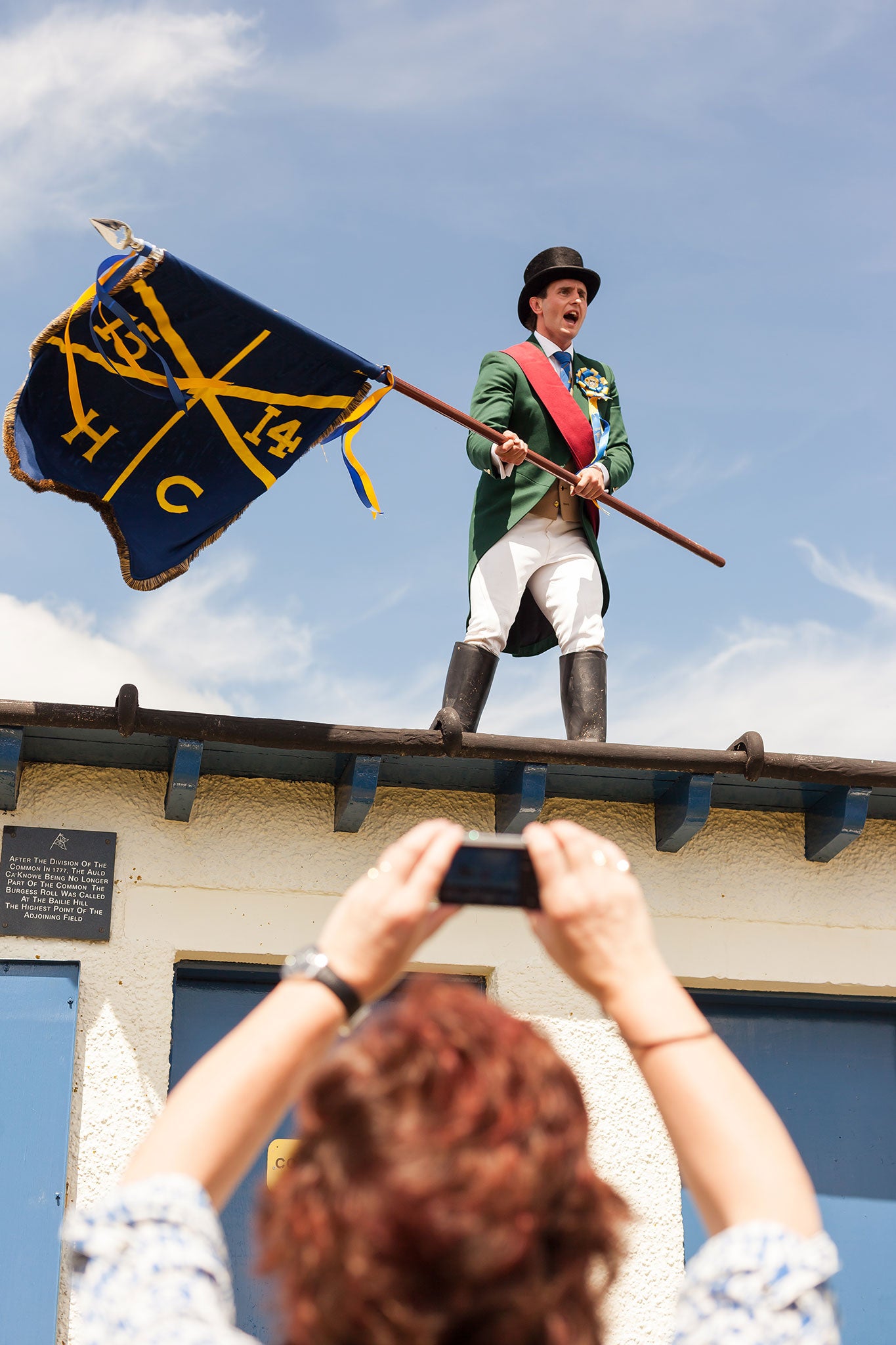
Your support helps us to tell the story
From reproductive rights to climate change to Big Tech, The Independent is on the ground when the story is developing. Whether it's investigating the financials of Elon Musk's pro-Trump PAC or producing our latest documentary, 'The A Word', which shines a light on the American women fighting for reproductive rights, we know how important it is to parse out the facts from the messaging.
At such a critical moment in US history, we need reporters on the ground. Your donation allows us to keep sending journalists to speak to both sides of the story.
The Independent is trusted by Americans across the entire political spectrum. And unlike many other quality news outlets, we choose not to lock Americans out of our reporting and analysis with paywalls. We believe quality journalism should be available to everyone, paid for by those who can afford it.
Your support makes all the difference.'COME in," says Ronnie Nichol, opening the door to his home. "A rum and milk for your breakfast?"
It isn't really a question. Not today. Not in Hawick. So Nichol, nodding with satisfaction, busies himself pouring the traditional beverage, first milk then a tot of dark spirit. It is 5.30am on Common Riding Friday – the loudest, proudest day in the local calendar. As leader of the Drum and Fife Band, it is Nichol's job to parade through the streets as soon as St Mary's strikes six, waking the town with shrill flutes and martial beats. A big, tough man of 54, barely contained in his black-and-gold uniform, he is a giddy child again while explaining what today means to him. "When I wake on New Year's morning, I know there's another Common Riding on the horizon and it's going to be the best day of the year."
Hawick (pronounced 'hoik') is one of several towns in the Scottish Borders to hold these annual summer rituals, rich in pageantry, during which locals on horseback ride out to mark the boundaries of the common land. Hawick's takes place on the first Friday after the first Monday in June, and, as the opening event in the Borders cycle, has a particular air of abandonment and joy. Especially this year. This is the 500th anniversary of the heroic act commemorated in the Common Riding – the capture, in 1514, of a flag from an English raiding party by the youth, or "callants", of Hawick, most of the adult males of the town having been killed at the Battle of Flodden the year before. Though all this happened five centuries ago, many here are still heart-sore at the thought of that bravery and blood, and so the Common Riding is not just a time of strong drink, but strong emotion, too.
That the 500th anniversary is taking place just a few months before the independence referendum, when thoughts of borders and boundaries and the troubled history with England are foremost in Scotland's mind, adds another layer of meaning. Nothing explicit, though. Today is about parochial pride, not national identity. As "Teribus", the stirring town anthem, has it: "Hawick was ever independent!".
Just 15 miles from the border with England and with a population of a little more than 14,000, Hawick has always been a town with a strong sense of itself as a place apart. There is an ancient truth to this feeling: the region having been squeezed up out of the sea bed millions of years ago as the land-masses which would become Scotland and England drifted towards each other. The Borders, therefore, geologically speaking, belongs to neither. The words of the song are true.
Hawick feels remote from Scotland's populous centre, and has lacked a train service since 1969. The Hawick tongue is among the most distinctive and, to an outsider, hard to follow of all Scotland's dialects. Locals, or Teries, have a tendency to regard themselves as separate, and in certain respects superior in character, to other Scots. There is even a sort of internal caste system, some Teries being pleased to refer to themselves as "guitter-bluids", meaning they were born in the oldest part of town, and – according to legend – the bloody afterbirth tossed into the gutter. In truth, most Teries these days are delivered in the Borders General Hospital, near Melrose, but the point remains – to be a true native is a grand and enviable thing. "I dinna ken," says Frank Scott, secretary of the Common Riding, "how people can live in any other toon."
Hawick is known as the "grey auld toon" but at Common Riding time it fills with colour. Blue and gold bunting is strung across the High Street, while pansies in those colours bloom in planters. Laburnum blossom droops golden from trees, and even the double yellow lines seem to take on a festive air. Banners carry Common Riding slogans – 'Rally Roond Oor Cornet'; 'Safe Oot Safe In' – gnomic to those not versed in the ceremony, and every local business seems to have dedicated its window dressing to the festival. Staff at one local beauty parlour have woven a 1514 flag from hair extensions. A cashmere mill displays a stuffed goat draped in Common Riding motley.
The festival begins with the election of the Cornet, the central figure of the Common Riding, a young man charged with carrying the Hawick flag at the head of a procession of horsemen to the boundaries of the town's common land, way out in the wilds, and returning it "unsullied and unstained". It is a tremendous honour but also a great responsibility and test of endurance. Common Riding Friday begins early, the ritual and revelry continuing until the following dawn when the Cornet sings "Teribus" into the rising sun. In between is The Hut, a huge hot barn where Teries gather in their hundreds, in an atmosphere somewhere between a Masonic lodge and a sweat lodge, to link arms, sink beers and sing, swaying, the popular song "Up Wi' Auld Hawick". The Hut is, for many, the high point of the year. "A cauldron of emotion," one man calls it. "Oor ain theatre of dreams."
Any prospective Cornet has to meet certain criteria. He must be unmarried and live at home with his parents, conditions said to keep Hawick's registry offices empty and family homes full. One young candidate, rumoured to be cohabiting with his girlfriend, received no fewer than three spot checks from a local worthy, dispatched by the town provost keen to ensure standards did not slip. This sounds stuffy and archaic, but it is considered vital that the right individual is chosen. The Cornet will remain a man of stature for the rest of his life, their name and year of office part of the town's collective memory. There is, perhaps, no fonder figure in Hawick than Charles Noel Whillans, known as Chuck, who is, at 90, the oldest living Cornet, having carried the flag in 1948.
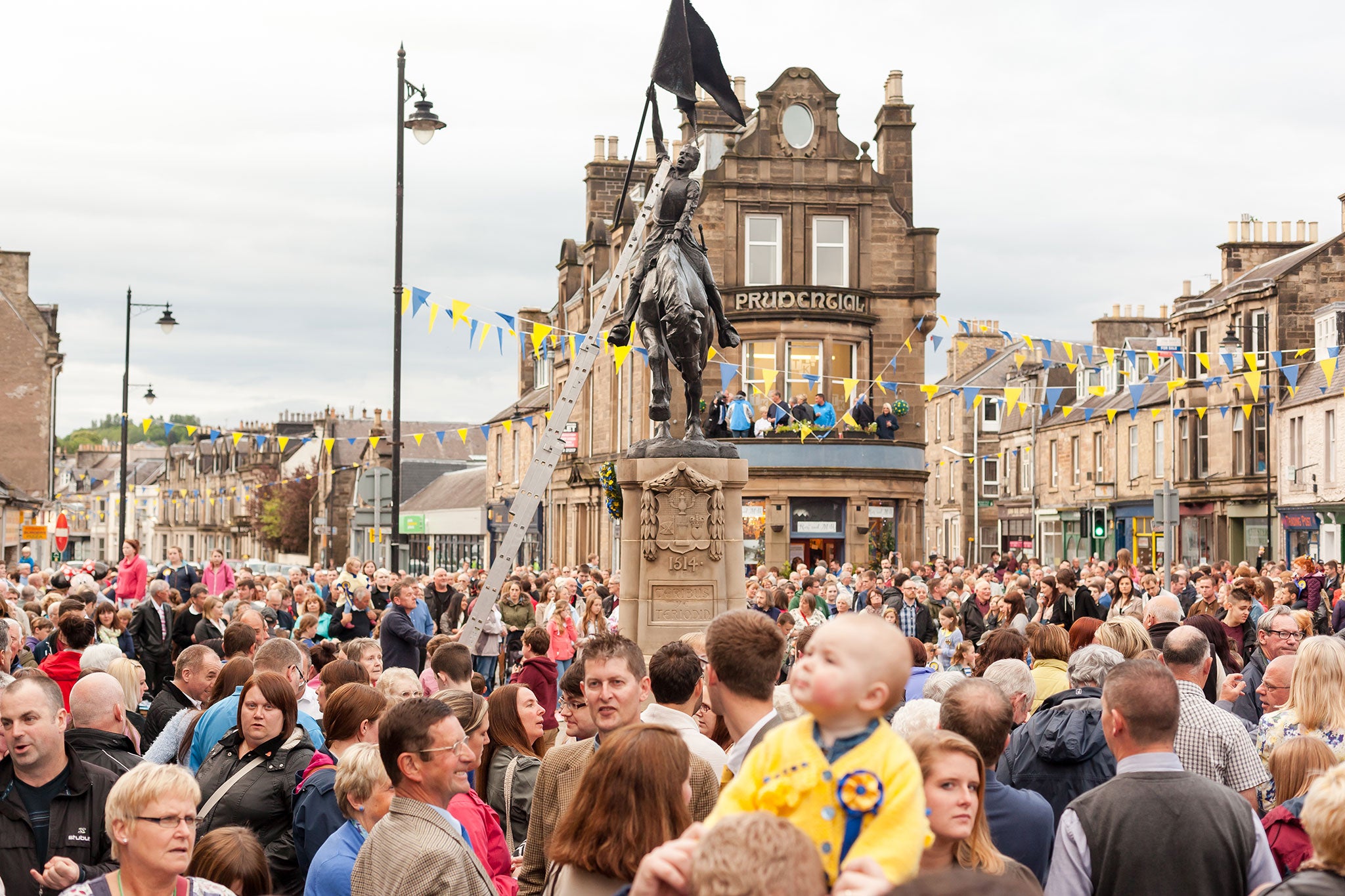
This year's Cornet is Ross Gibson, a 24-year-old electrician. It's a strange thing, becoming Cornet. You're just an ordinary bloke in the street and then, suddenly, cheered and revered by all, you transform into the dashing embodiment of all the town's history and self-love – Mr Darcy for the day.
There is a saying round these parts, "It's better felt than telt", meaning that the emotion of being Cornet can be experienced but never articulated. It is Ross Gibson's turn, now, to find that his tongue is but a poor mount for the feelings in his heart. "I've wanted this since I was tiny," he says. "It's hard to explain how much it means. It's bred into you in Hawick. The Common Riding is bigger than Christmas or New Year."
Hawick, like so many British towns, is struggling. People complain about youth unemployment and the number of empty shops. A great many of the textile mills on which Victorian Hawick's affluence was built have closed over the past 20 years, depleting the town of both jobs and identity. The large Burnfoot housing estate is one of the most deprived areas of Scotland. In this context, the Common Riding is even more important; a celebration of endurance and resilience rooted in the bloodbath of the 16th century, but which takes on new meaning when the forces ranged against the town are those of global economics rather than the military might of Henry VIII.
"Five hundred years ago we lost our men on the battlefield," says Audrey Gillies, a former mill worker and 45-year-old mother of four. "Five hundred years later, we're losing our young people because they have to travel the world to make a life for themselves."
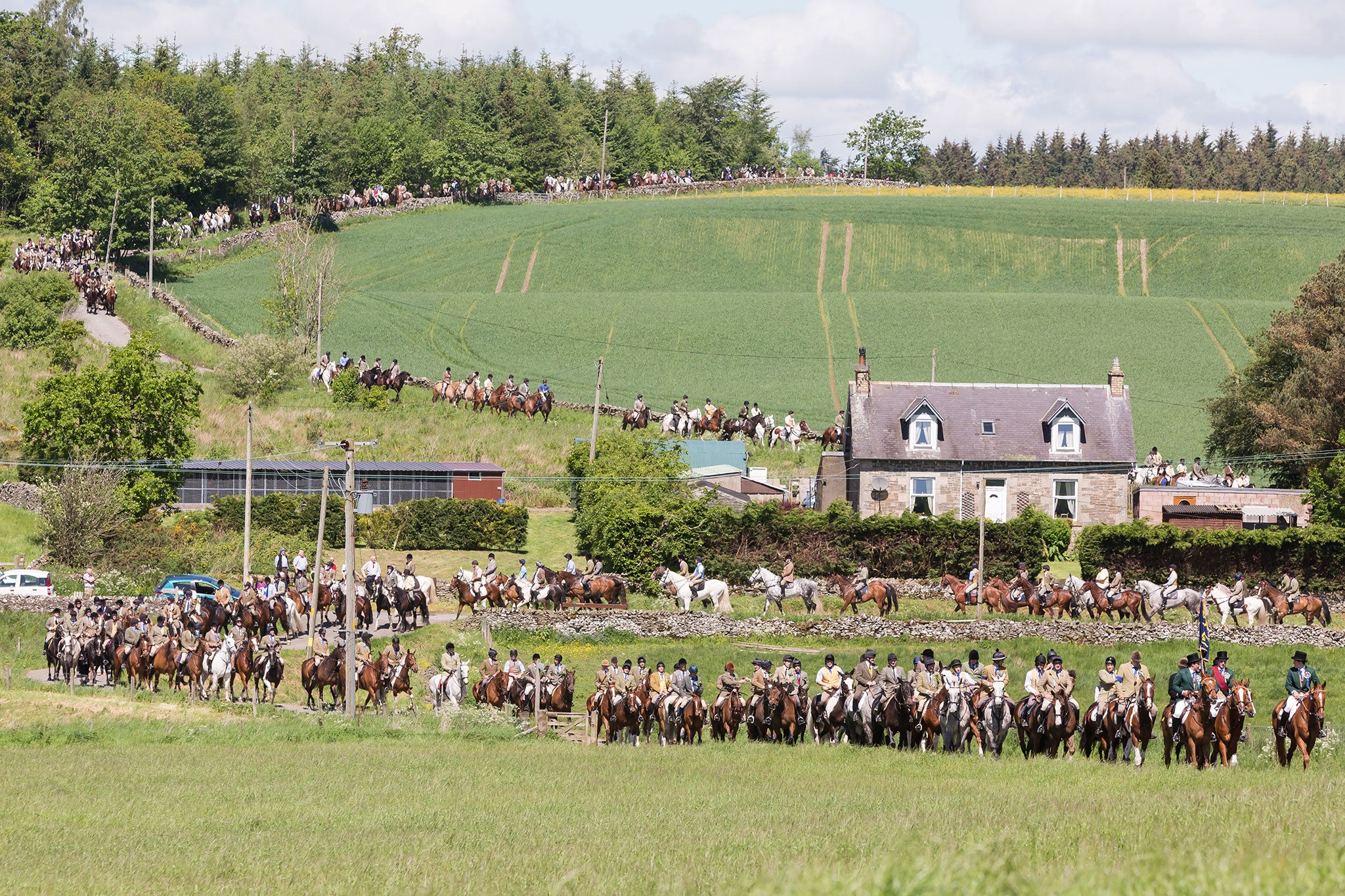
Gillies believes that an independent Scotland would be better able to help Hawick, and the whole nation, thrive again. Her desire for separation from the UK goes back to childhood, shaped in part by the words of "Teribus", which she has been singing since she was five. "There's an independence message running through our culture," she says. "The Common Riding is a rallying cry for us to celebrate our heritage and history. But independence is the rallying cry for modern times."
Polling suggests that Gillies is in a minority, with almost 60 per cent of voters in southern Scotland forecast to vote to stay in the union. Party politics in the south of Scotland slant Lib Dem and Tory, and there is a tendency here to support the status quo, embodied in the popular phrase, "It's aye been".
More, Borderers often feel connected to their neighbours in the south through work, leisure and personal relationships, and there are worries about the complexities of living in an independent Scotland but being employed in England. Where will they pay tax? In what currency will they receive their wages?
"I can see the day coming when businesses here refuse to take Scottish money. The poundzone will extend well into the Borders, I imagine," says Neil Richards, a 53-year-old gardener who is planning to vote no. "The UK is my country. I find it difficult to choose between England and Scotland. I love them both."
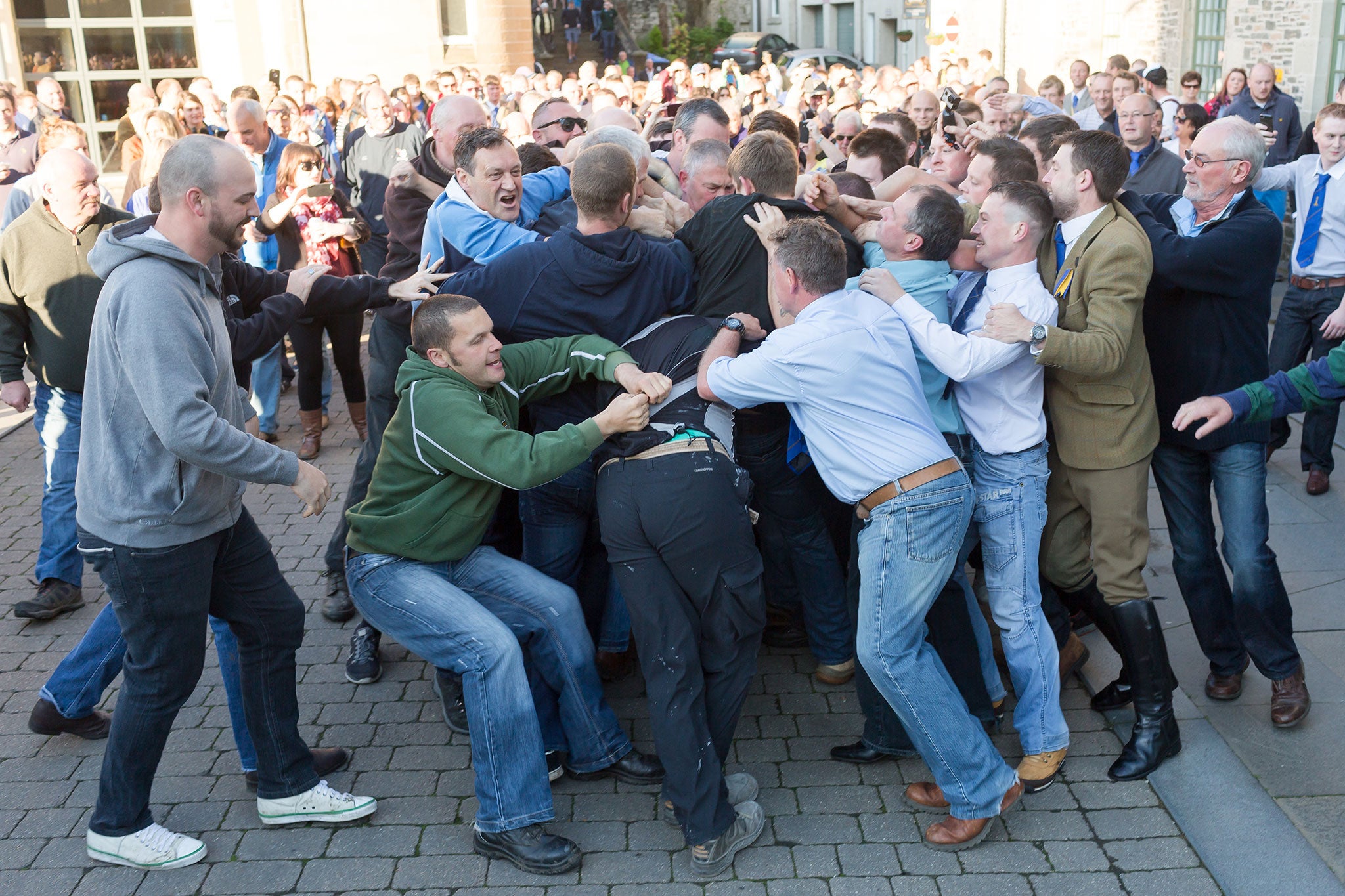
It will not be long before Hawick and Scotland confronts that choice. But on Common Riding morning, as Ronnie Nichol leads his musicians through the winding streets, it still feels far away. Teries in pyjamas and nighties waving down from the balconies of pebbledashed flats. At 6.15am, bang on schedule, the band march up Silver Street and pass one of the strangest sights of the whole Common Riding – The Snuffin'.
A burly crowd has gathered around a tall man holding an old ram's horn. Mike Aitken is a 53-year-old joiner, the official Song Singer of the Common Riding, and the man whose job it is to distribute snuff from this horn. In recent years, however, The Snuffin' has turned into a brawl, men from the neighbouring village of Denholm determined to wrestle the horn away > from Aitken and return home as triumphant pillagers. As a result, the Song Singer must have not just a beautiful baritone, but also a fine set of muscles. "Last year, it was close to being a stand-up punch-up and that's totally against everything it's meant to be," Aitken had explained earlier with some regret.
A shout goes up – "Come on, boys!" – and suddenly he is at the centre of a writhing, struggling, grunting scrum, all hoarse curses and builder's bum. Someone loses a shoe. A man in jodhpurs and riding boots sprawls, winded, on the cobbles. Neckless bruisers plunge meaty hands into the mass, grinning like Jack Horner when they see the dark snuff on their fingertips. It's all over in a few minutes, and although Aitken has tobacco smeared across the front of his shirt, he is satisfied that his tactics have worked. Hawick has the horn for another year. Teries do not readily give up what is theirs. That goes for heritage, too. This town is bonded to its own past like an infant cuddling into its mother.
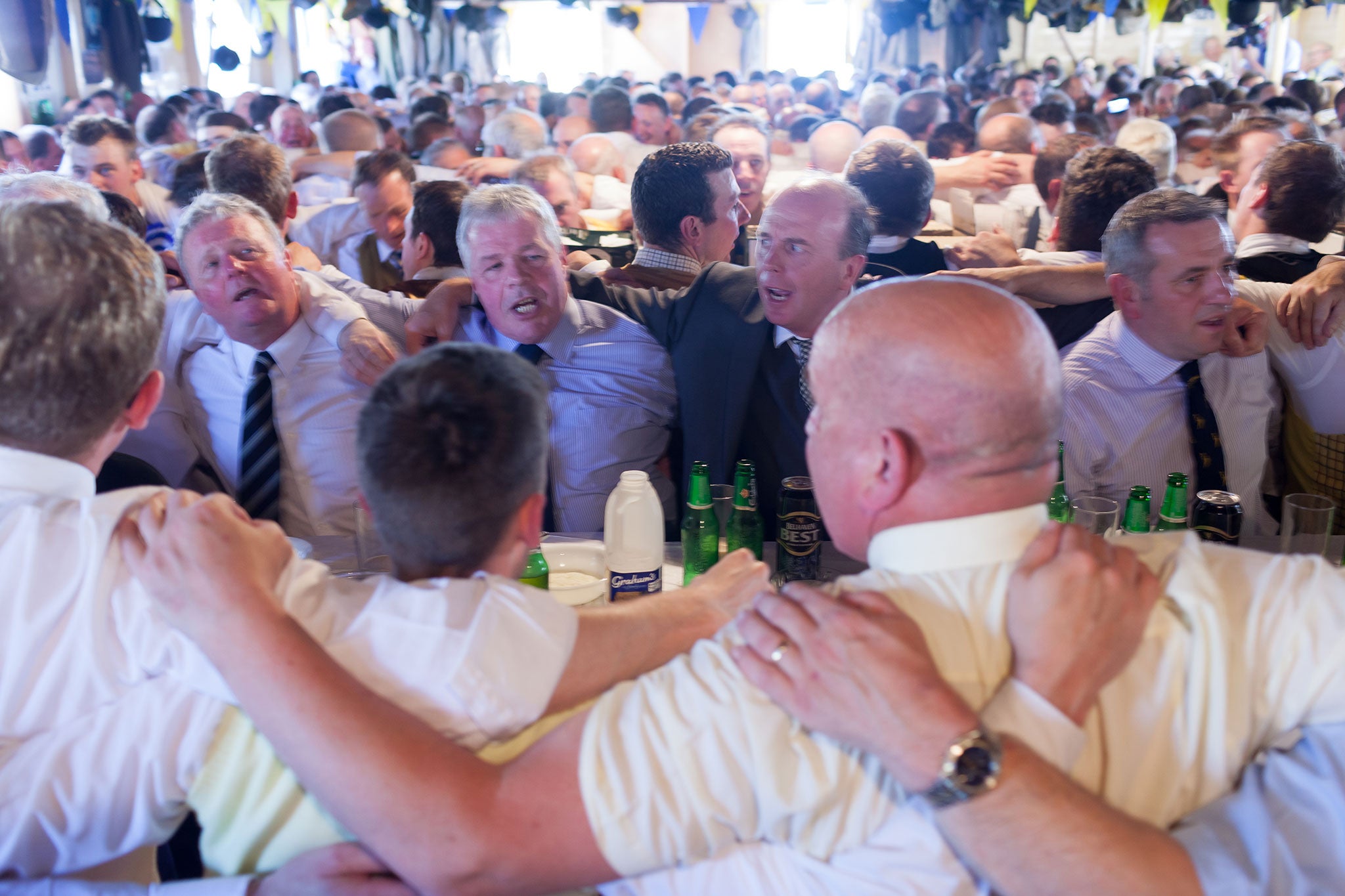
The pubs, despite the early hour, are packed. In The Exchange, the orders are all for rum and milk, and they're singing "Teribus" at the far end of the bar. "Ah, that gets the blood pumping," says Jean King, aged 58. "I lived in New Zealand two years and missed this so much. Each Common Riding morning, I cried."
Natives living away from Hawick are known as exiles. More than 300 have made a special effort to return for the Common Riding. From Victoria and Ontario; Ulan Bator, Kuala Lumpur, Aberystwyth; the Teries have come home. Hawick is also busy with visiting dignitaries from elsewhere in the Borders and Lothians. Each town holding a Common Riding sends an envoy to all other events. Thus, Hawick is tricked out in bowlers and toppers, sashes and spurs, tweeds of every hue, and so many rosettes of so many different colours that one might mistake this for a by-election in a key marginal.
Alex Campbell, a 68-year-old tailor, has been outfitting most of the Common Riding principals from his shop in Jedburgh since 1975. The Hawick Cornet is a client, as are the Musselburgh Honest Lad and Lass, the Jethart Callant, Kelso Laddie, and so on. Although each town announces who has been elected in early summer, Campbell is privy to this information months before, giving him time to make the ceremonial clothes, and he must therefore exercise discretion in a part of the world where everyone knows everyone else's business. "They come to me covertly," he says. "It's top-secret stuff." He remembers smuggling one principal to a fitting in the back of his car, hidden within a large cardboard box.
At a little before 9am, hundreds of riders assemble at the back of Drumlanrig Tower. It's a nervous moment, just before the ride. A few smoke fags or take horseback selfies. A petite woman in her fifties walks around offering a "stirrup cup" of port. This is Sally Niven, groom to the Cornet's steed for the past 29 years. She has been up since before dawn, plaiting manes and tails, oiling hooves, dressing bridles with ribbon. Despite being an accomplished horsewoman, she has never ridden in the Hawick Common Riding, but plans to do so this year, on the Saturday, to mark the 500th anniversary.
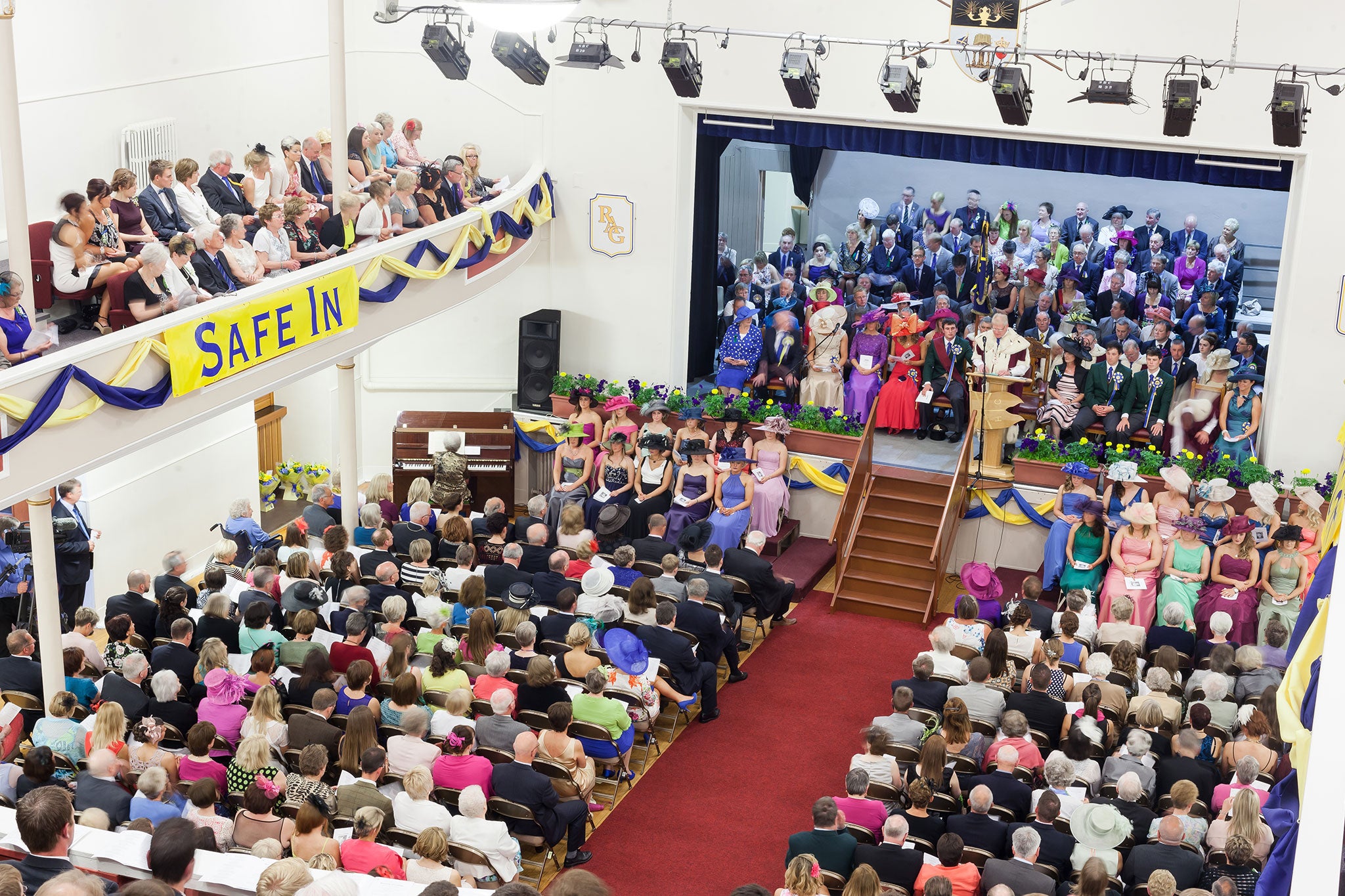
Hawick's Riding has been controversial in the past for its refusal to allow women to participate in certain aspects of the ceremony. There were ugly scenes of spitting and swearing in 1996 when two young local women decided to challenge this tradition and follow the Cornet on horseback in one of the ride-outs. Women are now permitted to take part in most of the rides, although the Friday morning procession and riding remain exclusively male, a decision said to be rooted in history when the only participants would be burgesses and landowners – all men. It remains a touchy subject. Most people seem happy to accept recent compromises, but there is clearly still some murmured discontent. "The message is you're a second-class citizen," says one Hawick woman, a veteran of ride-outs in other Borders towns, unwilling to give her name for fear of reprisals. "Just because I'm female, I'll never lead that parade."
It is difficult for an outsider to square this conflict and ill feeling with the hospitality and sense of togetherness evident on this special Friday. The local word 'oo' may be a simple translation of the English 'we', but it also resonates with shared experiences of hardship and joy: spilt blood; captured flags; closed mills; the return from distant lands of absent friends. No tourism driver, no media spectacle, the Common Riding is by the Teries for the Teries, and as the Cornet charges forth through the arch of Drumlanrig Tower at the head of four hundred riders, carrying the flag beneath a golden sun in an azure sky, it is clear that, whatever happens with the rest of Scotland, Hawick's independent spirit is eternal.
Looking on from the crowd is Chuck Whillans, the 90-year-old former Cornet, bursting with pride and memories. Wide-eyed, too, is Nicole Hook, seven months old, up on her dad's shoulders and wearing a yellow-and-blue cardigan knitted for the occasion. "We'll not live to see the next centenary," says Michael Hook, grinning at his daughter and wife. "It's so special that this is her first Common Riding".
Join our commenting forum
Join thought-provoking conversations, follow other Independent readers and see their replies
Comments